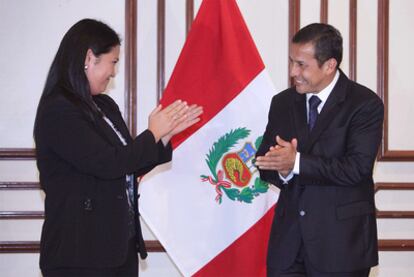Peru's president-elect calls for unity
Markets show distrust of new leader after Humala's narrow win over Fujimori
After barely winning the majority of ballots in Sunday's runoff election, Peru's President-elect Ollanta Humala promised to form a broad-based government and even suggested that he would invite members of the opposition to join it as he tries to mend divisions among Peruvians following a dirty campaign race.
The 48-year-old nationalist leader of the Win Peru alliance and former army officer narrowly defeated Keiko Fujimori of the right-wing Fuerza 2011 coalition. With more than 95 percent of the voting stations having delivered their results, Peru's election office (ONPE) reported on Tuesday that Ollanta had received 51.60 percent of the vote, or nearly 500,000 more ballots than Fujimori, who won 48.39 percent.
The daughter of jailed former President Alberto Fujimori conceded defeat late Monday and wished her opponent well. Humala will take office on July 28.
News of Humala's victory sent the Peruvian stock market plummeting 12.34 percent on Monday owing to the uncertainty of the incoming leader's economic policies. Ollanta campaigned on a platform calling for a better distribution of wealth for poor rural areas.
"Today, I reiterate my commitment with the Peruvian people to help push their economic growth and improve their social conditions," Humala said early Monday morning in Lima's Dos de May square where he declared himself the winner. "I realize that governing is not the task of one person so we are going to bring in the best independent technocrats who can help us create a broad-based government where no one will feel left out and everyone will be represented."
In her concession speech, Fujimori called on her supporters to work with the new president because "it is the moment to repair bridges and begin a dialogue."
Outgoing President Alan García also called on Peruvians to come together. "I would like to ask all Peruvians to put themselves at the disposal of the new government so that growth can continue," he said Monday.
The hotly contested runoff race was filled with personal accusations from both sides. Fujimori warned that Humala was "just another soldier" of Venezuelan President Hugo Chávez, while Humala accused her of helping cover up her father's human rights abuses when she served as first lady during her father's 1990-2000 term. The former president is serving a 25-year sentence for corruption and authorizing death-squad killings.
During the campaign, former Brazilian President Luiz Inácio Lula da Silva sent his advisors to help Humala's campaign as the candidate tried to disassociate himself from Chávez. His close connection with the Venezuelan leader cost him the election in 2006 when he first ran for office.
Humala hasn't said what economic policies he will introduce nor has he said who will be on his financial team. Following Monday's plunge, opposition politicians as well as financial analysts have asked Humala to name his advisors this week to calm the markets.
But it fell to Vice President-elect Marisol Espinoza to address those concerns. "It is up to the president and financial officials to lead this country until July 28 and take the necessary measures for the economy," she said.
For the past five years, Peru has experienced an average six-percent annual growth fueled by mining-industry investments. But sociologists, as well as human rights activists, say that profits have not been evenly distributed. Many of Lima's poor sectors on the capital's perimeter lack running water. In rural areas, residents have held protests against the mining activities of the international firms.

Tu suscripción se está usando en otro dispositivo
¿Quieres añadir otro usuario a tu suscripción?
Si continúas leyendo en este dispositivo, no se podrá leer en el otro.
FlechaTu suscripción se está usando en otro dispositivo y solo puedes acceder a EL PAÍS desde un dispositivo a la vez.
Si quieres compartir tu cuenta, cambia tu suscripción a la modalidad Premium, así podrás añadir otro usuario. Cada uno accederá con su propia cuenta de email, lo que os permitirá personalizar vuestra experiencia en EL PAÍS.
¿Tienes una suscripción de empresa? Accede aquí para contratar más cuentas.
En el caso de no saber quién está usando tu cuenta, te recomendamos cambiar tu contraseña aquí.
Si decides continuar compartiendo tu cuenta, este mensaje se mostrará en tu dispositivo y en el de la otra persona que está usando tu cuenta de forma indefinida, afectando a tu experiencia de lectura. Puedes consultar aquí los términos y condiciones de la suscripción digital.








































